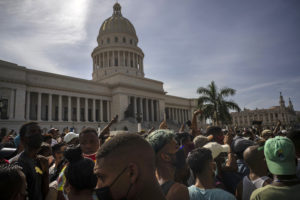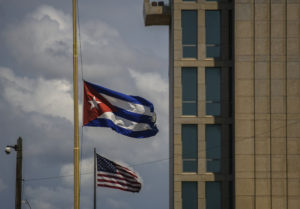In the U.S. relationship with Cuba, the President can take steps that would improve business opportunities, open new possibilities for U.S. philanthropy, expand American travel, bring health and medicinal benefits to the American people, and strengthen our security. These actions would begin to yield concrete results such as business deals, new medical research and innovation, and increased philanthropic activity in Cuba. For more information and legal rationale for each action, please see the more detailed version of these recommendations.
If adopted into policy, the following 14 steps would be good for the United States, good for the Cuban people, and could contribute to opening political space in Cuba:
- Further modify Office of Foreign Asset Control (OFAC) and Department of Commerce regulations governing exports to Cuba, imports from Cuba, and investments in Cuba that benefit the Cuban people. Regulatory changes will permit more U.S. businesses to sign agreements with Cuba this year, which will reinforce the interest of others in the business community.
- Provide a general license allowing U.S. philanthropic organizations to make program-related grants to government entities, non-governmental organizations and individuals in Cuba.
- Modify regulations to permit both private and public cooperation on health care and medical issues. Pharmaceutical companies and U.S. medical researchers from both the public and private sectors could sign agreements that will allow Americans to benefit from new health research and medical advances being pioneered in Cuba. Cubans would also benefit by being able to access new treatments and cutting edge drugs produced in the United States.
- Expand security cooperation agreements and streamline coordination. Security cooperation on drugs, law enforcement, migration, and other issues will benefit U.S. national interests while fostering greater commitment from U.S. agencies to maintain ongoing cooperation with Cuba.
- Expand travel by permitting individuals who are carrying out a full time program of people-to-people travel to do so independently under a general license. The flow of individual travelers would increase dramatically, stimulating new interest in travel to Cuba, especially among young people. This would also inject more capital into Cuba’s private sector.
- Facilitate and expand authorized travel and trade by taking vigorous action to solve the problems that continue to make most U.S. financial institutions reluctant to engage in authorized transactions with Cuba.
- Pursue a new approach toward Cuban society that will contribute to more open debate and discussion, and, over time, lead to progress on human rights and civil liberties. The State Department, our embassy, and other government agencies should engage in dialogue with a broad range of actors in Cuban society, who span the social and political spectrum, rather than narrowly judging Cuban actors through a regime change lens. The Administration should also work to facilitate dialogue and exchange between civil society groups in the United States and their counterparts in Cuba, without regard to political views. Space for political criticism and debate in Cuba has grown in recent years, and U.S. engagement with the range of civil society can contribute to and reinforce this trend.
The President could take foreign policy steps that would yield further improvements in our relations in the Western Hemisphere.
- President Obama should explicitly declare, in a speech or in remarks during his trip to Cuba that the Cold War is over and that regime change is no longer the goal of U.S. policy. This statement would be well-received, not only in Cuba, but throughout Latin America.
- The President or the Treasury Secretary should declare that the United States favors actions by the multilateral financial institutions to re-engage with Cuba.
- The administration should support Cuban re-engagement with the international economic system by eliminating U.S. barriers to Cuban commercial transactions with third countries. Change OFAC regulations to clearly authorize Cuba’s use of U.S. dollars in international transactions with third countries by adding a general license authorizing banks in the United States to clear dollar transactions between Cuba and third countries.
The President could take steps on U.S.-Cuban relations that would lay the groundwork for further cooperation and remove barriers to a constructive future.
- The administration should eliminate programs that fail to advance democracy, prosperity, or human rights, particularly programs or policies that are damaging to a more constructive relationship with the Cuban government:
a) End the Cuban Medical Professionals Parole Program, which offers incentives to Cuban doctors working abroad to leave their country and immigrate to the United States. The program is a provocation that provides no benefits to the United States, angers Cuba, and is an obstacle to cooperation on urgent global public health issues.
b) Suspend the “democracy promotion” programs now funded through the State Department’s Bureau of Democracy, Human Rights, and Labor (DRL) and the National Endowment for Democracy (NED), while conducting a review of existing programs to ensure they are consistent with the President’s policies. This includes ensuring that grantees do not support “regime change” strategies. As noted above, expand our contact with the range of Cuban civil society.
- The Attorney General should exercise her authority to end preferential treatment for Cuban migrants arriving at U.S. borders. The United States could then compensate by raising the quota of legal entries and establishing new visa programs that permit Cuban professionals to study or work in the United States and then return home.
- The administration should negotiate a settlement of outstanding “certified property claims” and take steps to address the problems for trade and financial relations posed by a small set of unusual legal judgments.


